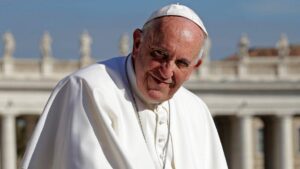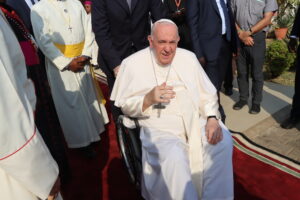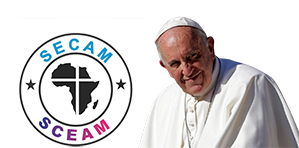VATICAN: In Annual Address to Diplomats Pope Francis Shares Concerns for Humanity

Sr. Jecinter Antoinette Okoth, FSSA
In an annual “family gathering” for members of the Diplomatic corps, Pope Francis has shared his concerns for humanity as he reflects on issues which include Covid-19 vaccine, climate change, migrants and education as a way of promoting a culture of dialogue and fraternity among other concerns.
Speaking to Ambassadors representing the 183 States that have diplomatic relations with the Holy See, the Pope noted that Covid-19 pandemic is still a concern hence everyone needs to make effort to fight against its spread in the world as it “continues to cause social isolation and to take lives.”
“We have realized that in those places where an effective vaccination campaign has taken place, the risk of severe repercussions of the disease has decreased,” the Pope said in his Monday, January 10, message and explained further, “It is therefore important to continue the effort to immunize the general population as much as possible.”
“This calls for a manifold commitment on the personal, political and international levels. First, on the personal level – each of us has the responsibility to care for our self and our health, and this translates into respect for the health of those around us, (since) health care is a moral obligation,” he said.
The Pontiff also urged the international community to be committed in ensuring that the “entire world population can have equal access to essential medical care and vaccines,” since some regions still lack access to vaccines.
“We can only note with regret that, for large areas of the world, universal access to health care remains an illusion. At this grave moment in the life of humanity, I reiterate my appeal that governments and concerned private entities demonstrate a sense of responsibility, developing a coordinated response at every level (local, national, regional, global), through new models of solidarity and tools to strengthen the capabilities of those countries in greatest need,” reads an excerpt of the Monday’s message.
During his “state of the world” address, the Pope further appreciated individuals and governments “working to ensure that migrants are welcomed and protected, and support human promotion and integration in the countries that have received them.”
“I am aware of the difficulties that some states encounter in the face of a large influx of people. No one can be asked to do what is impossible for them, yet there is a clear difference between accepting, albeit in a limited way, and rejecting completely,” Pope Francis shared with the Ambassadors adding that, “There is a need to overcome indifference and to reject the idea that migrants are a problem for others.”
He warned on dehumanization of migrants especially in “hotspots where they end up as easy prey to organized crime and human traffickers, or engage in desperate attempts to escape that at times end in death” saying “Sadly, we must also note that migrants are themselves often turned into a weapon of political blackmail, becoming a sort of “bargaining commodity” that deprives them of their dignity.”
Concerning education, the Pope highlighted its significance especially in the life of young generation who are the “future and hope of the world” saying, “Education is the primary vehicle of integral human development, for it makes individuals free and responsible.”
He acknowledged that the “educational process is slow and laborious, and can lead at times to discouragement, but we can never abandon it. It is an outstanding expression of dialogue, for no true education can lack a dialogical structure,” and at the same time education “gives rise to culture and builds bridges of encounter between peoples.”
He further emphasized that the Catholic Church recognizes and values “the role of education in the spiritual, moral and social growth of the young,” and it is unfortunate “The pandemic prevented many young people from attending school, to the detriment of their personal and social development.”
In concluding sharing his concerns with the Diplomats, Pope Francis reflected on the message of prophet Jeremiah, assuring the State Ambassadors not to be afraid to make “room for peace in our lives by cultivating dialogue and fraternity among one another,” underscoring that “the gift of peace is “contagious”; it radiates from the hearts of those who long for it and aspire to share it, and spreads throughout the whole world.”


